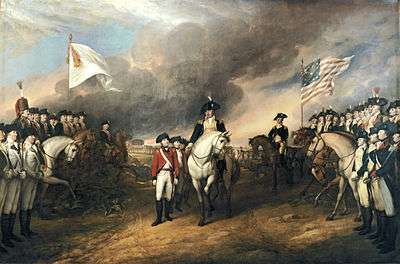New Hampshire Militia
The New Hampshire Militia was first organized in March 1680, by New Hampshire Colonial President John Cutt. The King of England authorized the Provincial President to give commissions to persons who shall be best qualified for regulating and discipline of the militia. President Cutt placed Major Richard Waldron of Dover in command of the Militia. In 1879, the Militia was designated by the state as the New Hampshire National Guard.
History
Colonial era
 |
| Armed Forces |
| United States |
|---|
| Great Britain |
| France |
| Related topics |
The New Hampshire Militia served in all of the Colonial Wars, and was part of expeditions that captured the Fortress of Louisbourg in 1745 and Port Royal, Nova Scotia in 1710. During the last four wars of the French and Indian Wars, the New Hampshire Militia furnished about 5,000 men for six different campaigns, including men who served with Major Robert Rogers and his Rangers. Regiments of the New Hampshire provincial soldiers were at the Battle of Lake George, the Siege of Fort William Henry, the Siege of Louisbourg (1758), the 1758 Battle of Carillon and the fall of Fort Carillon (subsequently Fort Ticonderoga) in 1759, the Battle of the Plains of Abraham and the Battle of Sainte-Foy near Quebec, and were present at the final capitulation of New France at Montreal. They also saw action in countless small battles from the Hudson River to Nova Scotia.
The Militia was also heavily involved in the American Revolution when it furnished men for the New Hampshire regiments in Washington's Continental Army. John Stark, an officer in Rogers' Rangers, raised the 1st New Hampshire Regiment and took it to the Siege of Boston in 1775 and fought at the Battle of Bunker Hill, along with James Reed's 3rd New Hampshire Regiment. These two regiments along with Enoch Poor's 2nd New Hampshire Regiment entered service with the Continental Army and saw action all through the war. In 1777 John Stark led a force of 1,500 New Hampshire, Massachusetts and Vermont militia at the Battle of Bennington in a surprise attack against over 1,400 Hessian, British, Tory and Indians and won a stunning victory that helped the Continental Army win the Saratoga Campaign. Two New Hampshire militia regiments were at the Battle of Saratoga serving in Ebenezer Learned's Brigade helping to defeat General John Burgoyne. New Hampshire militia helped in Gen. John Sullivan's unsuccessful Battle of Rhode Island in 1778.
Civil War era (1860-1880)
At the beginning of the American Civil War the Militia was virtually nonexistent. The state had to raise volunteer regiments, such as the 6th New Hampshire Volunteer Infantry, to aid in the war. In 1879, New Hampshire designated the Militia as the New Hampshire National Guard prior to the mandatory name change required by the National Defense Act of 1916.
Units
French and Indian War Provincial Units
New Hampshire Continental Army Regiments
New Hampshire Revolutionary War era militia Units
- Langdon's Company of Light Horse Volunteers
- Peabody's New Hampshire State Regiment
- Bellow's Regiment of Militia
- Chase's Regiment of Militia
- Drake's Regiment of Militia
- Evans' Regiment of Militia
- Hale's Regiment of Militia
- Hobart's Regiment of Militia
- Moore's Regiment of Militia
- Moulton's Regiment of Militia
- Nichols' Regiment of Militia
- Stickney's Regiment of Militia
- Welch's Regiment of Militia
See also
- Andrew McClary, fought in the New Hampshire; present at the battle of Bunker Hill.
External links
- "A Brief History of the 172nd Field Artillery Regiment, the 197th Field Artillery Regiment and Separate Units of the NH Army National Guard" (PDF).
- The ranger service in the upper valley of the Connecticut, and the most northerly regiment of the New Hampshire militia in the period of the revolution : an address delivered before the New Hampshire Society of Sons of the American Revolution at Concord, N.H., April 26, 1900
- State Builders: An Illustrated Historical and Biographical Record of the State of New Hampshire. State Builers Publishing Manchester, NH 1903
- Bibliography of the Continental Army in New Hampshire compiled by the United States Army Center of Military History